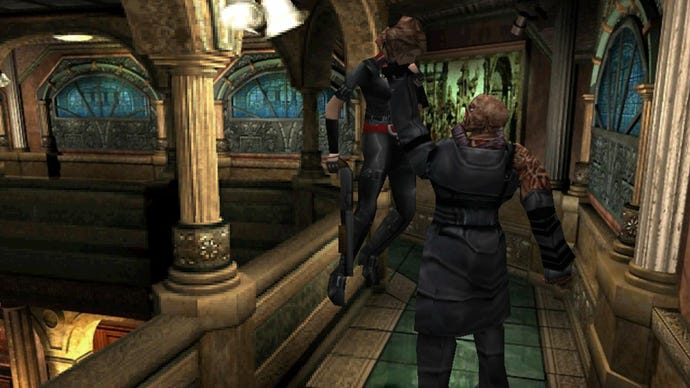Over the years, game retailers GOG have drifted from almost purely offering classic oldies to welcoming more and more modern blockbusters onto their storefront. In one sense, they've turned from a game preservation champion into a slightly dustier, DRM-less Steam. Now, though, GOG have declared a renewed focus on not just selling aged games, but on tweaking more of them to work on non-aged hardware. And you'll be able to tell which games have got this restoration treatment from a fancy badge plastered on top of them.
The GOG Preservation Program, as the endeavour is being called, is an extension of the store’s previous efforts in restoring older games (see their recent fix-ups of Alpha Protocol and the first Resident Evil trilogy). It's also combined with elements of Valve’s Steam Deck Verified system, which conveys whether a game performs well on the handheld.
First, GOG’s in-house software boffins set about squishing all the bugs and adding all the missing features (modern video codecs, Windows 10/11 compatibility, etc) that might prevent them from playing nice with an up-to-date PC. Then, the games that graduate this process get a certified "Good Old Game" badge on their store listing, showing at-a-glance that they’re ready to play without needing a bunch of unofficial patches or mods.
Badged games will also be "the most complete version available," in terms of DLCs, expansions, and even the availability of manuals and alternative languages. They’ll also come with offline installers and, of course, no DRM.
 Image credit: Capcom
Image credit: Capcom
To kick things off, over 100 games are being relaunched with Good Old Game status. These include Resident Evils 1, 2, and 3, the original Diablo (and its Hellfire expansion), System Shock 2, Vampire: The Masquerade – Bloodlines, both OG Fallout and Fallout: New Vegas, The Curse of Monkey Island, X-COM: UFO Defense and dozens more classics. Is it bad if I say I’d be particularly keen on playing an updated New Vegas over this (considerable) batch of old-old stuff? If anything, its relative newness makes me extra mad that I need to mod it so hard just to avoid my post-2008 graphics card breaking the framerate-based physics and sending my Courier whizzing about like they’re on rocket-strapped Heelys. Anyway, you can read the full list here.
"Our goal is for all games, whether recent or classic, to eventually become part of the Preservation Program," sayeth GOG themselves. "There is a long backlog of classic games available on GOG that may already qualify for the program, but our Team has not been able to confirm that yet. We aim to support as many games as possible, but it's not always entirely up to us."
Indeed, restoration projects like this require the original developers/publishers giving permission to poke around their games’ code, and you can probably imagine how that isn’t always forthcoming. And those on the game-making side won't be the only ones thinking about the bottom line: GOG ultimately exist to sell games, not immortalise them in museums, nor hand them out to people who owned an original CD-ROM copy back in yesteryear.
Still, on balance it’s probably better that someone profits off a healthy game preservation pipeline than to not have one at all, so it's hard to complain that much about this unusually niche-facing turn back towards GOG’s roots. It's a timely move too, considering disgruntled players have resorted to suing publishers for yanking games into unplayability through server shutdowns. Hopefully GOG persevere through any naysaying and can keep producing these offline-compatible, preservation-friendly semi-remasters for a good long while.

 1 month ago
91
1 month ago
91








![Anime Reborn Units Tier List [RELEASE] (November 2024)](https://www.destructoid.com/wp-content/uploads/2024/11/anime-reborn-units-tier-list.jpg)
